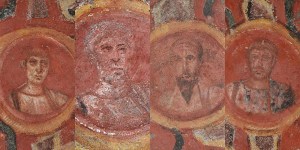We are often told that we should not “dig up the past” or “live in the past.” That is sage advice. Obsession with past wrongs can blind us to a good that is right before our eyes. And focusing excessively on the past can even be hazardous to your health. If you walk down the street while looking back at where you just were, you are likely to trip and fall!
The pull of the past
Yet, while it is necessary and good to live in the present, we cannot escape the past. It tugs on us in ways that we are often unaware of. Those who lack knowledge and understanding of what has gone before are often doomed to repeat past mistakes or to flit from one fad to another without benefiting from the wisdom of those who came before. G.K. Chesterton spoke of the importance of listening to tradition in his book Orthodoxy:
We will have the dead in our councils! The ancient Greeks voted by stones; these shall vote by tombstones. It is all quite regular and official, for most tombstones, like most ballot papers, are marked with a cross.
Finding Jesus and his followers
From its beginnings, Christianity has been tied to historical people, places, and objects. Within the first few hundred years of the death and resurrection of Christ, pilgrims were already traveling thousands of miles to visit sites that were associated with his life and ministry. They wanted to feel close to Jesus, experience healing, and grow in holiness.
The Church has always understood the importance of studying and preserving our Christian past. St Helena purportedly traveled to Jerusalem in the early 300s to seek the True Cross. During the Middle Ages, several cities claimed to have unearthed the Holy Grail.
But it was not just holy relics that Christians sought. By the late 1500s, the explorer Antonio Bossio, a follower of St. Philip Neri, was conducting a systemic exploration of the Roman catacombs. Even in the mid-20th century an incredible excavation took place looking for the bones of St. Peter. Do your search for “archaeology” in our archives and you will find countless other examples.
"Overwhelming joy"
Why this enthusiasm for archaeology? During a brief excavation at the Church of the Holy Sepulchre in 2016, Fr. David Grier, one of the custodians of the site, told CBS News:
What happened here 2,000 years ago completely changed the history of the world. To be able to dig, let’s say, to the rock where the body of Jesus was laid ... it’s overwhelming joy.
Joy cannot arise from an experience of death, only of life. Touching the rock where Jesus' body lay when he was resurrected, we are awestruck and filled with joy by the evidence that the living God truly walked among us. Reading about the catacombs or exploring the remains of a medieval monastery, we are amazed to see how the Christian faith endured persecutions and upheavals. And when we recognize these wonders in the company of our fellow believers, we come to see and believe that He is truly present now, just as he was 2,000 years ago.
More discoveries to come
While excavations have been conducted in the Holy Land for hundreds of years, there are still exciting discoveries being made. Later this week we will look at the new book The Archaeology of Jesus’ Nazareth (on our summer booklist!) that tracks down the purported location of the house where Jesus grew up with Mary. It may have been preserved in the basement of a convent and hardly anyone knows about it -- but soon you will!
In the days ahead, inspired by Dr. Jones, we will also look back at some of our favorite archeology-themed articles and have a few other surprises that should bring out the adventurer in you and your kids, so come back to Aleteia throughout the week.



